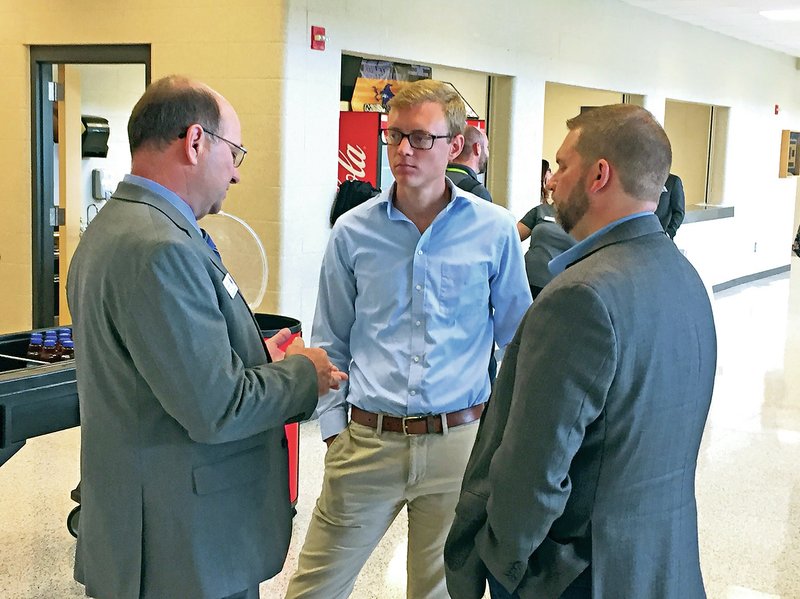ROGERS -- The implementation of professional learning communities at Rogers High School has made a big impact, the principal told a gathering of state legislators Friday.
Rogers High School was one of 11 schools participating this past year in the state's professional learning communities pilot project. The Legislature approved money for the project last year.
Professional Learning Communities Project
The following Arkansas schools were selected last year from among 83 that applied to participate in the state’s Professional Learning Communities pilot project:
• Ballman Elementary School (Fort Smith)
• Bragg Elementary School (West Memphis)
• Douglas MacArthur Junior High School (Jonesboro)
• Eastside Elementary School (Greenbrier)
• Mitchell Intermediate School (Vilonia)
• Robinson Middle School (Pulaski County)
• Monticello Middle School
• Morrilton Intermediate School (South Conway County)
• Premier High School of Little Rock
• Prescott School District
• Rogers High School
• Spradling Elementary School (Fort Smith)
Source: Arkansas Department of Education
Principal Lewis Villines spoke Friday before a joint meeting of the House and Senate education committees in a Rogers High School science classroom. About two dozen legislators turned out for the meeting.
Student achievement at his school is increasing, something he attributed to the professional learning communities. Teachers have been empowered to test new methods in their classrooms and they are growing as leaders, Villines said.
"I want to say thank you," he told legislators. "I believe this endeavor is the most impactful thing to Arkansas education in my 25 years as an educator."
Rogers High School this week hosted the Professional Learning Communities at Work Institute, a three-day conference attended by more than 1,000 educators from five states. Solution Tree, a national professional development organization specializing in team building among teachers as a way to improve student learning, put on the conference.
The Professional Learning Communities at Work process centers around three big ideas -- focus on learning, build a collaborative culture and create a results orientation, according to an Arkansas Department of Education news release. Educators work collaboratively in recurring cycles of collective inquiry and action research to achieve better results for the students they serve.
Rogers High School's freshmen math scores last year were the best among the district's three high schools, the first time that's happened in Villines' five years as an administrator there. Scores went up in other areas as well, he said.
"We're not satisfied. We met yesterday about how we're going to get even better," he said.
Villines discussed a teacher at his school who previously had been very strict about students turning in assignments on time. A zero was a zero and she would offer no opportunity for students to make up that grade.
That teacher has softened her approach as a result of the professional learning community process, giving students more confidence one bad decision won't lead to failure.
"Her students felt a greater sense of efficacy because she was encouraging them to try," Villines said.
State Sen. Joyce Elliott, a retired teacher from Little Rock, seemed to agree with that approach. She said a student's final grade should take into account the improvement the student has made over the course of a semester rather than a simple average of grades on all tests and assignments, a system she called "archaic."
Students should get second chances just like adults do, said Tina Smith, policy and special projects director at the Arkansas Department of Education.
"Can you take the bar exam more than once? Can you take the CPA exam more than once?" Smith said.
Legislators attended the concluding keynote speech of this week's conference by Anthony Muhammad, an educator, educational consultant and author of the book Transforming School Culture. He is a strong advocate of the Professional Learning Communities at Work model.
Muhammad, a native of Flint, Mich., addressed a packed auditorium at Rogers High School for nearly two hours about the challenges involved in changing a school's culture to better meet students' needs.
"Everybody loves improvement, but not everyone loves change," Muhammad said.
There is technical change and cultural change in schools. The cultural change is the much harder of the two, he said.
Muhammad also explained how many schools force students to conform to certain methods that aren't right for them. A square peg can be made to fit a round hole, but that requires mutilating the peg, he said.
"The problem with schools is, we try to make everybody the same. That kills some kids' enthusiasm, and it supports others," he said.
NW News on 07/14/2018
